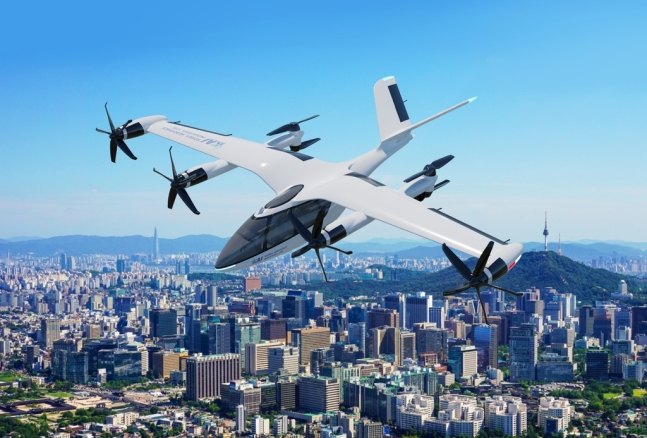KAI joins project to develop hydrogen-powered aircraft
It will take part in pilot operations of advanced mobility for a provincial innovation megaproject
By May 31, 2023 (Gmt+09:00)
LG Chem to sell water filter business to Glenwood PE for $692 million


Kyobo Life poised to buy Japan’s SBI Group-owned savings bank


KT&G eyes overseas M&A after rejecting activist fund's offer


StockX in merger talks with Naver’s online reseller Kream


Mirae Asset to be named Korea Post’s core real estate fund operator



South Korea's aerospace and defense company Korea Aerospace Industries Ltd. (KAI) on Wednesday said it joined a project of industry, academic and research institutes to develop a future commuter plane with a hybrid-distributed electric propulsion system using hydrogen fuel cells.
The plane can carry 19 passengers in going short distances to and from cities.
Eleven institutions including KAI on Tuesday launched pilot operations for a regional innovation megaproject for advanced mobility at Gyeongsang National University in Jinju, South Gyeongsang Province. The Ministry of Science and ICT is overseeing the test run and Korea Innovation Foundation is supporting it.
The project seeks to find mid- to long-term science and technology projects in the region and conduct research with industry, academia and research institutes. Between this year and 2025, 5.5 billion won ($4.1 billion) of national budgetary support will go into the project.
KAI will supervise the setting of system requirements for the development of a hybrid power system using hydrogen fuel cells, distributed electric propulsion system and commuter plane technology featuring low carbon and noise and high performance and evaluation of technological testing. This is to secure eco-friendly technology for aircraft powered by such cells that emit no carbon.
In addition, KAI is using its own funds to develop the NI-500VT (Night Intruder-500 Vertical Takeoff and Landing), a low-carbon green plane using a hybrid propulsion system.
KAI is also conducting preliminary research on an electric dispersion propulsion system and prop/rotor optimal shape design, or core technologies of advanced air vehicles. By the first half of next year, it plans to advance flight control logic and simulation technology through test flights of scaled-down aircraft.
Write to Hyung-Kyu Kim at khk@hankyung.com
-
 Aerospace & DefenseKAI secures deal to export 18 FA-50 light fighters to Malaysia
Aerospace & DefenseKAI secures deal to export 18 FA-50 light fighters to MalaysiaMay 23, 2023 (Gmt+09:00)
1 Min read -
 Aerospace & DefenseS.Korean Army opens Future & Innovation Research Center at KAIST
Aerospace & DefenseS.Korean Army opens Future & Innovation Research Center at KAISTMay 22, 2023 (Gmt+09:00)
1 Min read -
 Aerospace & DefenseHanwha Systems, KAI sign contracts to develop SAR satellites
Aerospace & DefenseHanwha Systems, KAI sign contracts to develop SAR satellitesMay 18, 2023 (Gmt+09:00)
2 Min read -
 Aerospace & DefenseKorean aircraft maker KAI earmarks $3.4 bn in R&D investment by 2032
Aerospace & DefenseKorean aircraft maker KAI earmarks $3.4 bn in R&D investment by 2032Mar 17, 2023 (Gmt+09:00)
2 Min read -
 Aerospace & DefenseKAI to develop flight training simulator with 3D game company
Aerospace & DefenseKAI to develop flight training simulator with 3D game companyMar 03, 2023 (Gmt+09:00)
1 Min read -
 Aerospace & DefenseS.Korea's KAI signs $105 mn deal to supply parts for Boeing aircraft
Aerospace & DefenseS.Korea's KAI signs $105 mn deal to supply parts for Boeing aircraftFeb 28, 2023 (Gmt+09:00)
1 Min read -
 Future mobilityKAIST, Hyundai sign agreement for high-speed self-driving research
Future mobilityKAIST, Hyundai sign agreement for high-speed self-driving researchFeb 23, 2023 (Gmt+09:00)
1 Min read


